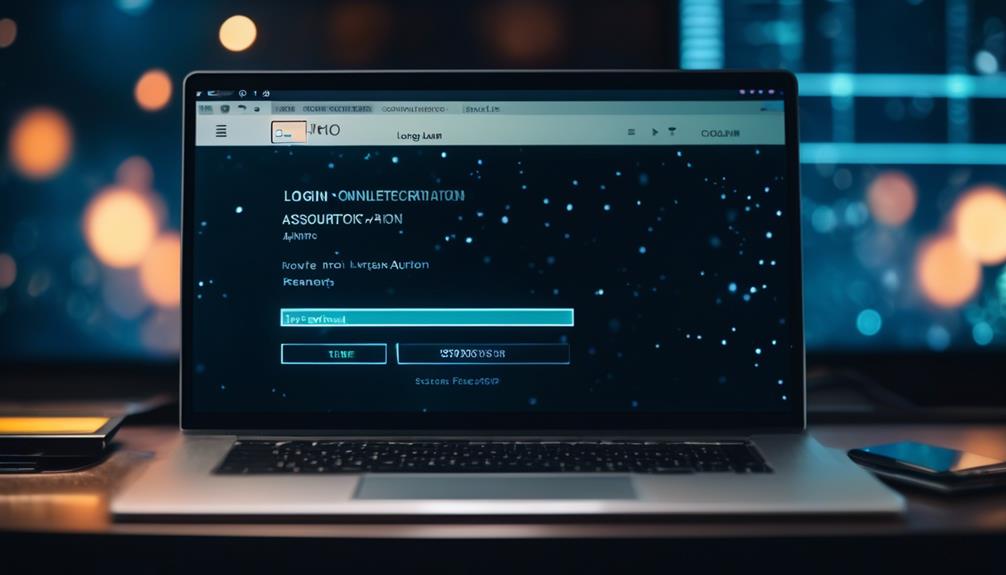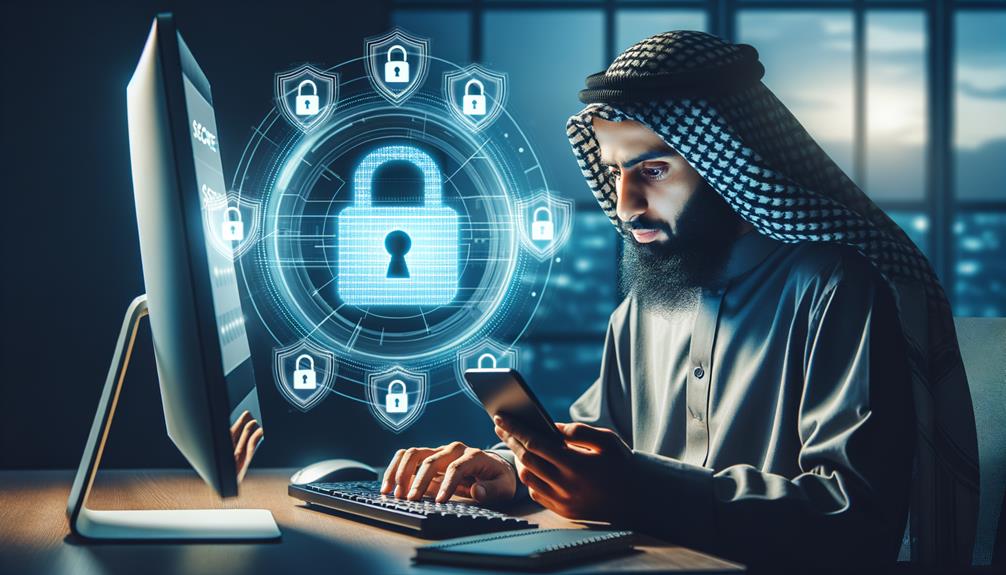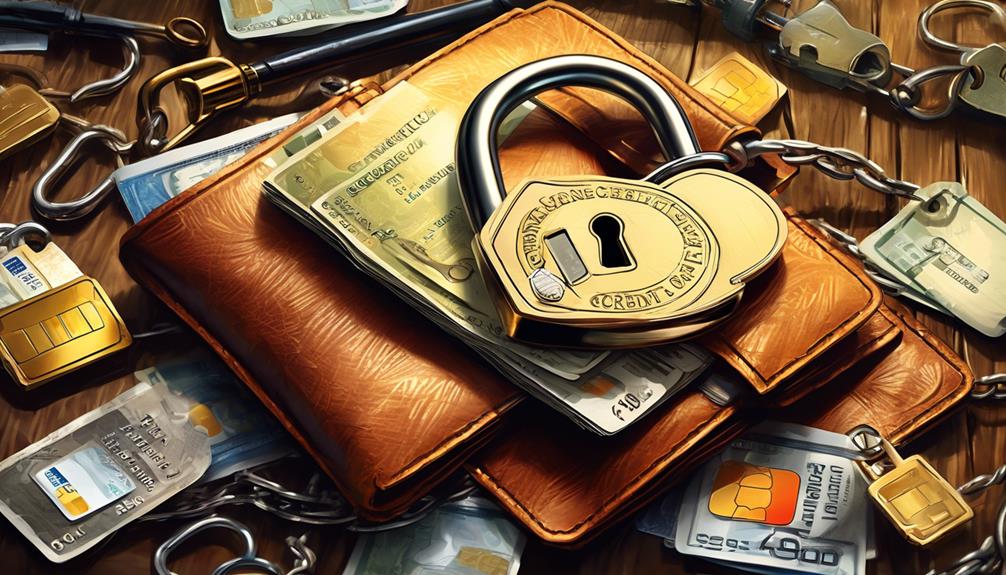In spite of the ease of online banking, some may hesitate due to security concerns. Yet, with digital transactions on the rise, it's crucial to enhance online finance security. This guide presents practical strategies to safeguard financial information from cyber threats, offering peace of mind in the digital financial world.
Understanding Online Financial Risks

Understanding Online Financial Risks means recognizing threats and vulnerabilities in internet transactions. Financial security is crucial for individuals and institutions. It's important to prioritize online banking security to protect personal and financial data. Security measures such as strong passwords and two-factor authentication are vital. Choosing a bank with industry-standard security technology enhances online security. Using secure networks and avoiding public Wi-Fi for banking transactions minimizes unauthorized access risk. Additional security measures like enabling account alerts and reviewing statements regularly are important. Being cautious of phishing attempts and suspicious links further fortifies online financial security. Understanding potential risks and taking proactive steps enhances confidence and security in online financial transactions.
Strengthening Password Protection
To bolster online banking security, individuals should use strong passwords with a mix of characters. Avoid easily guessable information and refrain from reusing passwords. Consider using a password manager for generating and storing complex passwords. Additionally, enable multifactor authentication for an extra layer of security. Ensure accessing accounts from secure networks and consider using a VPN for added security. These measures significantly enhance online banking security.
Recognizing Phishing Attempts

When spotting phishing attempts, be cautious with emails or messages asking for banking credentials. These often involve deceptive tactics to obtain sensitive information. To prevent falling victim, verify senders before clicking links, check email addresses for irregularities, and preview URLs before clicking. Use two-factor authentication for added security when accessing online financial information.
Securing Personal Wi-Fi Network
Securing your personal Wi-Fi network with a strong password is crucial to protect your online financial information. This step helps to safeguard sensitive data and prevent unauthorized access to your accounts and apps. When conducting financial transactions, it's important to rely on your secure home network rather than using public Wi-Fi, which can pose security risks. For added security when accessing your Wi-Fi network remotely, consider using a virtual private network (VPN). Keeping your network security software and firmware updated is vital to stay protected against potential vulnerabilities and breaches. Caution is also necessary to avoid falling for phishing attempts that could compromise your Wi-Fi network's security. Implementing strong security practices, such as using unique username and password combinations for different accounts and deploying anti-virus software, can further enhance the protection of your personal Wi-Fi network. Following these measures ensures that your online financial activities are conducted in a secure and protected environment.
Implementing Two-Factor Authentication

Enhancing online banking security through Two-Factor Authentication requires a second form of identification along with a password. This extra step significantly reduces the risk of unauthorized access. To effectively implement Two-Factor Authentication, link it to a mobile device for added security. Additionally, use authenticator apps like Google Authenticator or Authy for generating secure codes. Enabling Two-Factor Authentication not only keeps personal information and financial transactions secure but also adds an extra layer of security for accessing software and online stores.
Regular Software Updates
Regular software updates are crucial for securing online financial transactions and personal information. By installing the latest security patches and bug fixes, users can prevent potential vulnerabilities. Automating the update process ensures applications and operating systems stay current without constant manual intervention.
Importance of Updates
Regularly updating devices and software with the latest security patches is crucial to protect against cyber threats and ensure the integrity of online financial transactions. By doing so, you can improve security, fix bugs, and address potential weaknesses in online banking applications. Delaying updates can leave devices and software vulnerable to cyberattacks and malware, making regular updates essential for maintaining the security and integrity of online financial transactions. Moreover, updating software and applications ensures that online banking platforms have the latest security features and protections. To further protect online finance security, individuals should also consider using strong passwords, avoiding public networks when accessing sensitive financial information, and being cautious when using unsecured Wi-Fi. It's important to update web browsers to keep them safe when using the internet.
Risks of Outdated Software
Neglecting software updates increases vulnerability to cyber attacks. Outdated software compromises online finance security, risking sensitive information. Essential to maintain integrity, protect against malware, and cyber attacks. Neglecting updates threatens Mobile Banking and email alerts. Staying current with software versions is crucial. Staying up to date ensures systems have latest security patches and fixes, reducing risks.
Automate Update Process
Implementing automated update processes for software is crucial to consistently protect systems with the latest security measures. This is especially important for online finance security, as it safeguards financial accounts and sensitive information from potential cyber threats. When automating the update process, ensure to automate regular software updates to have the latest security patches and bug fixes in place. This helps maintain the overall security of the system and protects against vulnerabilities and potential exploits. Furthermore, automated updates help protect financial accounts, account activity, account information, large transactions, and investment accounts from being targeted by cybercriminals due to outdated software.
Educating Against Social Engineering Scams
To avoid falling victim, individuals must recognize phishing and pretexting tactics commonly used in social engineering scams. Phishing involves fraudulent emails or texts from reputable sources, prompting recipients to disclose sensitive information. Pretexting manipulates individuals into divulging personal information or compromising security through fabricated scenarios. It is crucial to educate against these scams, emphasizing the importance of safeguarding personal information. This involves refraining from sharing sensitive details in response to unsolicited requests. Additionally, being cautious on public Wi-Fi and avoiding clicking on links or downloading attachments from unknown sources is important. Fostering a culture of skepticism and providing comprehensive cybersecurity awareness training can help individuals better protect themselves.
Frequently Asked Questions
What Are Effective Ways to Enhance Online Security?
Enhancing online security involves managing strong passwords, enabling two-factor authentication, and using secure browsing methods. Additionally, increasing phishing awareness, maintaining firewall protection, and regularly updating systems are essential. Utilizing data encryption, verifying identity, and safely storing sensitive information also play a crucial role.
How Can I Improve My Online Banking Security?
In order to enhance online banking security, it is important to use two-factor authentication. Additionally, strong passwords and biometric verification should be utilized. It is also essential to install security software and practice phishing prevention. Regularly monitoring accounts and employing data encryption are crucial. Furthermore, ensure to keep all software updated and maintain safe browsing habits. These measures collectively bolster protection against cyber threats.
Which Is a Way of Improving Online Account Security?
Enhancing online account security requires multi-factor authentication, strong passwords, and biometric verification. Additionally, employing security questions, device authentication, and secure connections is essential. Regular monitoring, fraud alerts, and identity protection are also crucial for preventing unauthorized access and safeguarding sensitive information.
What's One Step You Plan to Take to Improve Your Online Security?
She will activate two-factor authentication to enhance security. This crucial step will better protect her online accounts. With this added layer of security, she can effectively prevent unauthorized access and potential cyber threats.
Conclusion
In the rapidly expanding digital world, securing financial data is crucial. By following the guide, individuals can strengthen online security and thwart cyber threats. Like a vigilant guardian safeguards their castle, individuals can protect their online assets from malicious actors, ensuring a secure financial future.



